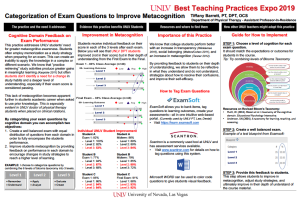Dr. Mary-Ann Winkelmes is nationally recognized as the founder of the Transparency in Learning and Teaching in Higher Education Project (TILT Higher Ed), which she shared with the ACUE Community in 2016. As a faculty developer, Winkelmes is also passionate about initiatives to promote teaching and learning on campus, including an annual Best Teaching Practices Expo that kicked off at the University of Nevada, Las Vegas, in 2017. This month, Winkelmes started a new job as executive director of Brandeis University’s Center for Teaching and Learning, but she was still excited to talk to the ACUE Community in a Q&A about UNLV’s Expo and showcase her colleagues’ work.
What originally inspired you to organize a “Best Teaching Practices Expo,” and how has it evolved?
While UNLV has a tradition of excellence in scholarship and teaching, the UNLV Best Teaching Practices Expo in January 2017 was the first of its kind as a large, campus-wide event to call attention to scholarly, evidence-based approaches to teaching and learning at the institution. That first iteration was a poster exhibition, and we reached out to lots of faculty to recruit posters and generate interest in attending. This year’s event attracted many poster proposals, selected 34 posters, and drew hundreds of faculty who came to participate, talk with presenters, attend the panel presentations, and enjoy a buffet lunch together. The posters are published online on UNLV’s Best Teaching Practices site, making them widely accessible and easy for poster authors to cite in future publications or grant funding proposals.
The poster session is usually followed by panel sessions on shared themes like increasing students’ metacognition, engaging students across difference, and apps and tools to enhance learning. This year we added real-time voting by attendees, who used their cell phones or tablets to identify which practice they are most likely to adopt this term (The People’s Choice Award went to the poster on Dynamic Lightboard Videos for teaching online mathematics courses by Kristina Schmid, Peter McCandless, and Eddie Gomez).
What have you learned from the experience? What’s surprised you?
I had high expectations for this event, but I think even I was surprised by the large extent to which it is an engine for the Scholarship of Teaching and Learning at UNLV. Some of these posters can lead to peer-reviewed publications and even external grants. For example, Jen Utz’s poster for increasing formative assessment and engagement during labs is related to her National Science Foundation grant, while Tiffany Howard’s poster from the 2018 Expo developed into a publication, “Transparency Teaching in the Virtual Classroom: Assessing the Opportunities and Challenges of Integrating Transparency Teaching Methods with Online Learning,” published in the Journal of Political Science Education.
What advice do you have for CTL directors or faculty developers who may want to bring similar events to their institution?
For colleagues undertaking a similar event, I’d suggest involving faculty, staff, and students in the organization, as we did. I’d also advise explicitly aligning the criteria for selection with the focus areas of the final posters and with the call for proposals. Our four criteria/focus areas were:
1. the practice and the significance of the need it addresses
2. evidence the practice benefits UNLV students
3. resources and where to find them (including state of research)
4. how other UNLV teachers might adopt this practice
This ensures the community sees the criteria multiple times, and they know that all posters will address these key points. This alignment gives some structure to a visitor’s experience when they visit the Expo, and it establishes criteria for excellence and even for voting during the event. An event like this is a great way to generate cross-campus conversations around evidence-based practices for improving teaching and learning experiences across the institution.
Behind the Poster
Dr. Tiffany Barrett, a Distinguished Contributor from the 2019 Best Teaching Practices Expo, shares a summary of her poster on the Categorization of Exam Questions to Improve Metacognition.
Students often employ memorization as a study strategy when preparing for an exam.
This can create an inability to apply the knowledge in a complex or different scenario. Students don’t often identify a need for a change in study habits and a deeper level of understanding, especially if their exam score is considered passing. By categorizing your exam questions by cognitive domain, you can accomplish two objectives: First, create a well-balanced exam with equal distribution of questions from each domain in order to fully encompass the  students’ performance. Secondly, improve students’ metacognition by providing feedback on performance in each domain to encourage changes in study strategies to reach a higher level of learning. UNLV students receive individual feedback on their score in each of the three cognitive levels after each exam. It was shown that students improved not in their score, but in their depth of understanding from the first exam to the final. By providing feedback to students on their depth of understanding, we allow them to be reflective in what they understand and do not understand, strategize about how to resolve their confusion, and improve their self-efficacy.
students’ performance. Secondly, improve students’ metacognition by providing feedback on performance in each domain to encourage changes in study strategies to reach a higher level of learning. UNLV students receive individual feedback on their score in each of the three cognitive levels after each exam. It was shown that students improved not in their score, but in their depth of understanding from the first exam to the final. By providing feedback to students on their depth of understanding, we allow them to be reflective in what they understand and do not understand, strategize about how to resolve their confusion, and improve their self-efficacy.
Dr. Tiffany Barrett is an assistant professor-in-residence at UNLV. She earned her Bachelor of Science in Nutritional Sciences from the University of Nevada, Reno and her Doctor of Physical Therapy (DPT) degree from the University of Colorado.


